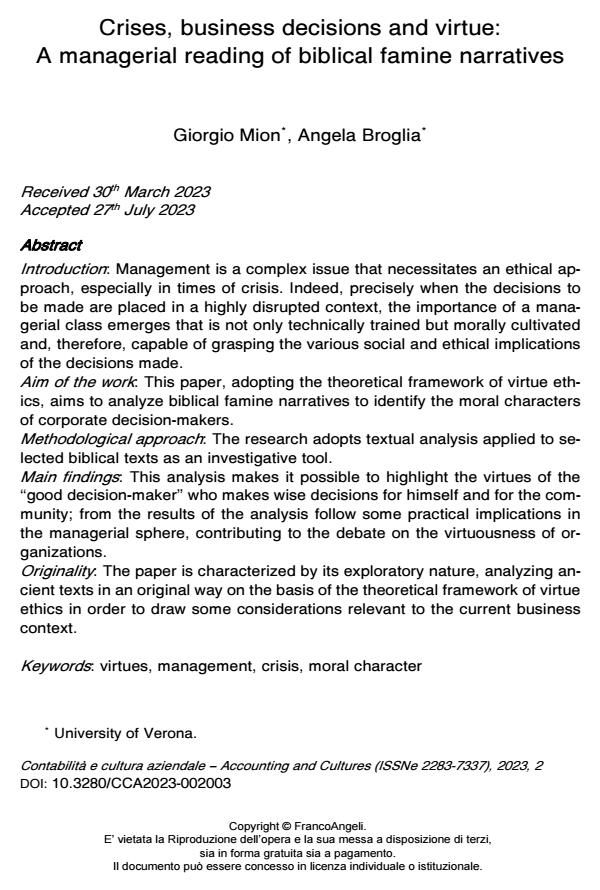Crises, business decisions and virtue: A managerial reading of biblical famine narratives
Titolo Rivista CONTABILITÀ E CULTURA AZIENDALE
Autori/Curatori Giorgio Mion, Angela Broglia
Anno di pubblicazione 2024 Fascicolo 2023/2
Lingua Inglese Numero pagine 28 P. 35-62 Dimensione file 170 KB
DOI 10.3280/CCA2023-002003
Il DOI è il codice a barre della proprietà intellettuale: per saperne di più
clicca qui
Qui sotto puoi vedere in anteprima la prima pagina di questo articolo.
Se questo articolo ti interessa, lo puoi acquistare (e scaricare in formato pdf) seguendo le facili indicazioni per acquistare il download credit. Acquista Download Credits per scaricare questo Articolo in formato PDF

FrancoAngeli è membro della Publishers International Linking Association, Inc (PILA), associazione indipendente e non profit per facilitare (attraverso i servizi tecnologici implementati da CrossRef.org) l’accesso degli studiosi ai contenuti digitali nelle pubblicazioni professionali e scientifiche.
Introduction: Management is a complex issue that necessitates an ethical approach, especially in times of crisis. Indeed, precisely when the decisions to be made are placed in a highly disrupted context, the importance of a managerial class emerges that is not only technically trained but morally cultivated and, therefore, capable of grasping the various social and ethical implications of the decisions made. Aim of the work: This paper, adopting the theoretical framework of virtue eth- ics, aims to analyze biblical famine narratives to identify the moral characters of corporate decision-makers. Methodological approach: The research adopts textual analysis applied to selected biblical texts as an investigative tool. Main findings: This analysis makes it possible to highlight the virtues of the “good decision-maker” who makes wise decisions for himself and for the community; from the results of the analysis follow some practical implications in the managerial sphere, contributing to the debate on the virtuousness of organizations. Originality: The paper is characterized by its exploratory nature, analyzing an- cient texts in an original way on the basis of the theoretical framework of virtue ethics in order to draw some considerations relevant to the current business context.
Parole chiave:virtues, management, crisis, moral character
Giorgio Mion, Angela Broglia, Crises, business decisions and virtue: A managerial reading of biblical famine narratives in "CONTABILITÀ E CULTURA AZIENDALE" 2/2023, pp 35-62, DOI: 10.3280/CCA2023-002003